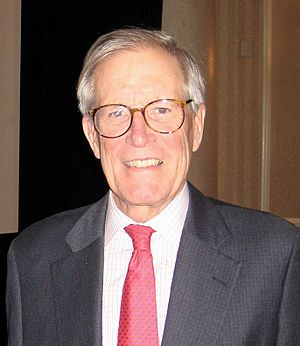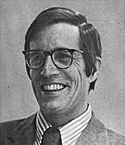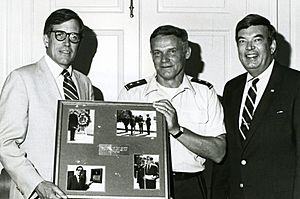Pete du Pont facts for kids
Quick facts for kids
Pete du Pont
|
|
|---|---|

Du Pont in 2011
|
|
| 68th Governor of Delaware | |
| In office January 18, 1977 – January 15, 1985 |
|
| Lieutenant | James D. McGinnis Mike Castle |
| Preceded by | Sherman W. Tribbitt |
| Succeeded by | Mike Castle |
| Member of the U.S. House of Representatives from Delaware's at-large district |
|
| In office January 3, 1971 – January 3, 1977 |
|
| Preceded by | William Roth |
| Succeeded by | Thomas B. Evans Jr. |
| Member of the Delaware House of Representatives from the 12th district |
|
| In office January 7, 1969 – January 3, 1971 |
|
| Preceded by | David Benson |
| Succeeded by | William Poulterer |
| Personal details | |
| Born |
Pierre Samuel du Pont IV
January 22, 1935 Wilmington, Delaware, U.S. |
| Died | May 8, 2021 (aged 86) Wilmington, Delaware, U.S. |
| Political party | Republican |
| Spouse | Elise Ravenel Wood |
| Children | 4, including Ben |
| Relatives | See du Pont family |
| Education | Princeton University (BS) Harvard University (LLB) |
Pierre Samuel "Pete" du Pont IV (born January 22, 1935 – died May 8, 2021) was an American lawyer, businessman, and politician. He was from Rockland, Delaware, near Wilmington, Delaware. He served as a U.S. Representative for Delaware from 1971 to 1977. Later, he became the 68th governor of Delaware from 1977 to 1985. He was a member of the Republican Party.
Contents
Early Life and Education
Pierre Samuel du Pont IV was born in Wilmington, Delaware, on January 22, 1935. He was part of the famous Du Pont family. His parents were Pierre S. du Pont III and Jane Holcomb du Pont. His great-uncle, Pierre S. du Pont, created Longwood Gardens.
Pete du Pont went to Phillips Exeter Academy. He then studied at Princeton University and Harvard Law School. After college, he served in the U.S. Naval Reserve from 1957 to 1960. He was married to Elise Ravenel Wood. They had four children: Elise, Pierre V, Ben, and Eleuthère.
Political Career Highlights
From 1963 to 1970, du Pont worked for the E.I. du Pont de Nemours and Co. In 1968, he was elected to the Delaware House of Representatives. He served there until 1971.
Serving in the U.S. House of Representatives
In 1970, Pete du Pont was elected to the U.S. House of Representatives. He won two more elections in 1972 and 1974. As a Congressman, he supported the War Powers Act of 1973. This law aimed to limit the President's power to start wars. He remained loyal to President Richard Nixon during his impeachment process.
Becoming Governor of Delaware
Instead of running for Congress again, du Pont ran for Governor of Delaware in 1976. He won against the current governor, Sherman W. Tribbitt. He was re-elected in 1980. He served as governor from January 18, 1977, to January 15, 1985.
As Governor, du Pont made big changes to Delaware's economy. He signed laws that lowered income taxes. He also supported a change to the state's constitution. This change limited how much taxes could be raised and how much the government could spend. These actions helped improve Delaware's business environment.
In 1979, he started "Jobs for Delaware Graduates." This program helped high school seniors find jobs if they were not going to college. It became a model for similar programs in other states and countries.
Boosting Delaware's Economy
In 1981, Governor du Pont helped bring the credit card industry to Delaware. At that time, South Dakota had removed its limits on interest rates banks could charge. Delaware wanted to attract banks too.
With help from business leaders, du Pont passed the Financial Center Development Act in 1981. This law encouraged banks to move to Delaware. It was meant to attract banks that would hire many people. This law brought over thirty banks to Delaware. It created 43,000 new jobs related to finance. This helped Delaware rely less on the chemical industry.
Running for President
After his second term as governor ended in 1985, many thought du Pont would run for U.S. Senator. However, he was more interested in running for President. He announced his plan to run for the Republican presidential nomination in 1986. This was for the 1988 election.
In the 1988 Republican presidential primaries, du Pont had some unique ideas. He suggested letting people put their Social Security money into private savings. He also wanted to stop government payments to farmers. He proposed helping people on welfare get jobs, even if the government had to create entry-level jobs. He also suggested drug tests for students. If students failed, they could lose their driver's licenses. After getting few votes in the New Hampshire primary, he ended his campaign.
Later Career and Contributions
In 1984, du Pont led the Education Commission of the States. This group works to improve education across America. He also served as chairman of the Hudson Institute from 1985 to 1987. He was also chairman of the National Review Institute from 1994 to 1997.
Du Pont was the chairman of the board for the National Center for Policy Analysis. This is a research group in Dallas, Texas. He also worked as a director at a law firm in Wilmington, Delaware. Until 2014, he wrote a monthly column for the Wall Street Journal.
Death
Pete du Pont passed away at his home in Wilmington on May 8, 2021. He had been ill for a long time.
Images for kids
-
Du Pont greeting President Gerald Ford in 1975
-
Du Pont with President Ronald Reagan and Vice President George H. W. Bush in 1983
See also
 In Spanish: Pete du Pont para niños
In Spanish: Pete du Pont para niños
 | James Van Der Zee |
 | Alma Thomas |
 | Ellis Wilson |
 | Margaret Taylor-Burroughs |





